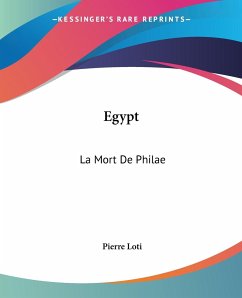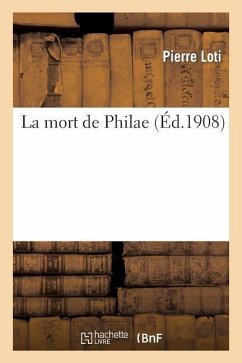
Egypt
La Mort De Philae
Versandkostenfrei!
Versandfertig in 1-2 Wochen
22,99 €
inkl. MwSt.

PAYBACK Punkte
11 °P sammeln!
""La Mort De Philae"" is a novel by French author Pierre Loti, which is set in Egypt. The story revolves around the temple of Philae, which is a sacred place for the ancient Egyptians. The novel describes the beauty and grandeur of the temple and its surroundings, as well as the customs and traditions of the people who live nearby.The main character of the book is a Frenchman who travels to Egypt and becomes fascinated with the temple of Philae. He spends time exploring the ruins and studying the history of the temple, and he becomes increasingly drawn to the ancient culture and beliefs of the...
""La Mort De Philae"" is a novel by French author Pierre Loti, which is set in Egypt. The story revolves around the temple of Philae, which is a sacred place for the ancient Egyptians. The novel describes the beauty and grandeur of the temple and its surroundings, as well as the customs and traditions of the people who live nearby.The main character of the book is a Frenchman who travels to Egypt and becomes fascinated with the temple of Philae. He spends time exploring the ruins and studying the history of the temple, and he becomes increasingly drawn to the ancient culture and beliefs of the Egyptians.As the story progresses, the Frenchman becomes involved in a conflict between the local people and the British authorities who are trying to take control of the area. He witnesses the destruction of the temple and the displacement of the people who live there, and he is forced to confront the reality of colonialism and the impact it has on the people and culture of Egypt.Overall, ""La Mort De Philae"" is a powerful and thought-provoking novel that explores themes of cultural identity, colonialism, and the clash between ancient traditions and modernity. It is a must-read for anyone interested in the history and culture of Egypt, as well as those interested in exploring the complex issues surrounding colonialism and cultural preservation.A city of mosques, then, as I was saying. They follow one another along the streets, sometimes two, three, four in a row; leaning one against the other, so that their confines become merged. On all sides their minarets shoot up into the air, those minarets embellished with arabesques, carved and complicated with the most changing fancy. They have their little balconies, their rows of little columns; they are so fashioned that the daylight shows through them.This scarce antiquarian book is a facsimile reprint of the old original and may contain some imperfections such as library marks and notations. Because we believe this work is culturally important, we have made it available as part of our commitment for protecting, preserving, and promoting the world's literature in affordable, high quality, modern editions, that are true to their original work.












